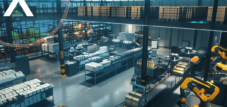
The cold chain industry: Challenges, opportunities and new developments in logistics and intralogistics – Image: Xpert.Digital
📦❄️ The essential role of the cold chain industry in modern food supply
🥶 Challenging requirements and innovative opportunities in the cold chain industry
The cold chain industry is an essential component of the modern food supply chain, encompassing a wide range of products. Perishable goods include dairy products, frozen foods, and fresh produce such as fruits and vegetables. Unlike conventional warehousing, storing these foods in cold storage facilities requires precise temperature control, strict inventory management, and rapid order fulfillment to maintain product quality and safety standards. These specific requirements create unique challenges but also offer numerous opportunities for innovation and efficiency improvements.
In cold storage facilities serving supermarkets and restaurant chains, inventory is characterized by a high product variety, small batch sizes, and rapid turnover. Essential to this process is managing goods based on expiration dates, best-before dates, and delivery information. This requires a continuous flow of storage, retrieval, and order picking based on specific requirements. Any delay or inaccuracy can significantly impact product freshness and overall quality.
Traditionally, cold storage of food relied heavily on manual labor. Tasks such as order picking, packing, and inventory management were often performed by hand. However, this approach regularly led to inefficiencies, higher labor costs, and an increased risk of errors. With the advent of automation technologies, however, the industry has undergone a remarkable transformation toward more streamlined and optimized processes.
🤖💼 Automation and digitalization in the cold chain industry
Automation has the potential to fundamentally transform the cold chain industry. By using modern technologies such as robotics, artificial intelligence (AI), and sophisticated warehouse management systems (WMS), many processes can be made more efficient and error-free. For example, automated storage and picking systems enable more precise inventory management and faster order fulfillment. Robots can pick products faster and more accurately than humans, increasing efficiency and minimizing errors.
Another advantage of automation is the reduction of dependence on manual labor, which is a significant benefit given the shortage of skilled workers in many countries. Furthermore, automated systems can operate 24/7, which considerably increases warehousing and distribution capacities.
In addition to automation, digitalization also plays a crucial role. Modern warehouse management systems are capable of processing and analyzing large amounts of data in real time. This allows for better forecasting of demand and inventory levels, leading to more optimized warehousing. Through the integration of IoT (Internet of Things) sensors, temperature and humidity in warehouses can be continuously monitored and controlled to ensure optimal storage conditions.
⚠️🛠️ Challenges and Risks
Despite the numerous advantages that automation and digitalization bring, the cold chain industry also faces significant challenges. One of the biggest challenges is the substantial investment required to implement these technologies. Smaller companies may find it difficult to afford to invest in expensive automation systems, which could lead to a division within the industry.
Another problem is the dependence on technical systems. If an automated system fails, the consequences can be severe. It is therefore essential to have robust backup systems and contingency plans in place to minimize downtime and ensure business continuity.
The security of stored and transmitted data is also a crucial aspect. Data breaches or cyberattacks could jeopardize the integrity of the entire supply chain, potentially leading to both financial and security-related consequences. Therefore, implementing robust cybersecurity measures to protect systems from such threats is essential.
🌎♻️ Sustainability in the cold chain industry
Another important issue in the cold chain industry is sustainability. Cold storage facilities and refrigerated logistics require significant amounts of energy, leading to increased CO2 emissions. To address this, more and more companies are adopting more environmentally friendly technologies and practices.
Energy-saving refrigeration systems, the use of natural refrigerants, and the optimization of transport routes are just some of the measures being taken by the industry. Such initiatives not only contribute to reducing environmental impact but can also lead to significant cost savings in the long run. Furthermore, many companies are promoting the recyclability of packaging materials and reducing food waste through more precise inventory management and improved planning tools.
🔮🚀 Innovations and future prospects
The future of the cold chain industry promises further significant innovations and developments. Technologies such as blockchain could play a greater role in the future by improving transparency and traceability within the supply chain. Every movement of a product could be recorded in an immutable digital ledger, increasing trust in the supply chain and ensuring product safety.
Drones and autonomous vehicles could also be integrated into cold chain logistics, particularly in remote or difficult-to-access areas. Such technologies have the potential to significantly reduce delivery times and increase delivery efficiency.
The cold chain industry faces both significant challenges and exciting opportunities. With increasing automation and digitalization, new possibilities are emerging to increase efficiency, reduce costs, and ensure product safety and quality. At the same time, it remains essential to confront these challenges and develop innovative solutions to overcome them. Continuous adaptation and development will determine the industry's success in the coming years.
📣 Similar topics
- 🌐 Digitalization in logistics: Automated intralogistics for the future
- 🔧 Challenges and solutions in modern warehousing
- 🚀 Robots, drones and AGVs: Warehouse automation technologies
- 📈 Efficiency and error reduction through warehouse automation
- 🏷️ Intelligent order picking and warehouse management systems
- 📊 Using data and IoT to optimize warehouse processes
- 🌟 Future prospects of intralogistics: AI and machine learning
- 🔍 Decision criteria for selecting automated systems
- 💼 Competitive advantages through automation in intralogistics
- 🏭 Industry 4.0: The Transformation in Warehousing
#️⃣ Hashtags: #Intralogistics #WarehouseAutomation #Digitalization #Industry4.0 #FutureViability
Xpert partner in warehouse planning and construction
Xpert.Plus warehouse optimization - high-bay warehouses such as pallet warehouses consulting and planning
We are there for you - advice - planning - implementation - project management
☑️ Smart City & Factory: Industry expert for energetic 5G buildings and halls as well as advice and installation of solar systems
☑️ Xpert.Plus - logistics consulting and logistics optimization
☑️ Industry expert, here with his own Xpert.Digital Industry Hub with over 2,500 specialist articles
I would be happy to serve as your personal advisor.
You can contact me by filling out the contact form below or simply call me on +49 89 89 674 804 (Munich) .
I'm looking forward to our joint project.
Xpert.Digital - Konrad Wolfenstein
Xpert.Digital is a hub for industry with a focus on digitalization, mechanical engineering, logistics/intralogistics and photovoltaics.
With our 360° business development solution, we support well-known companies from new business to after sales.
Market intelligence, smarketing, marketing automation, content development, PR, mail campaigns, personalized social media and lead nurturing are part of our digital tools.
You can find out more at: www.xpert.digital - www.xpert.solar - www.xpert.plus

